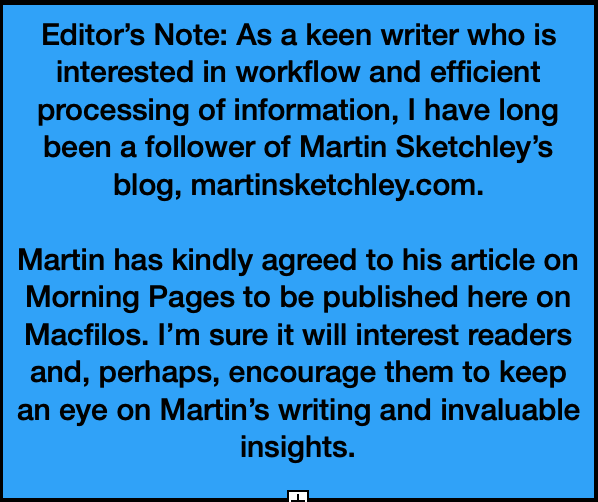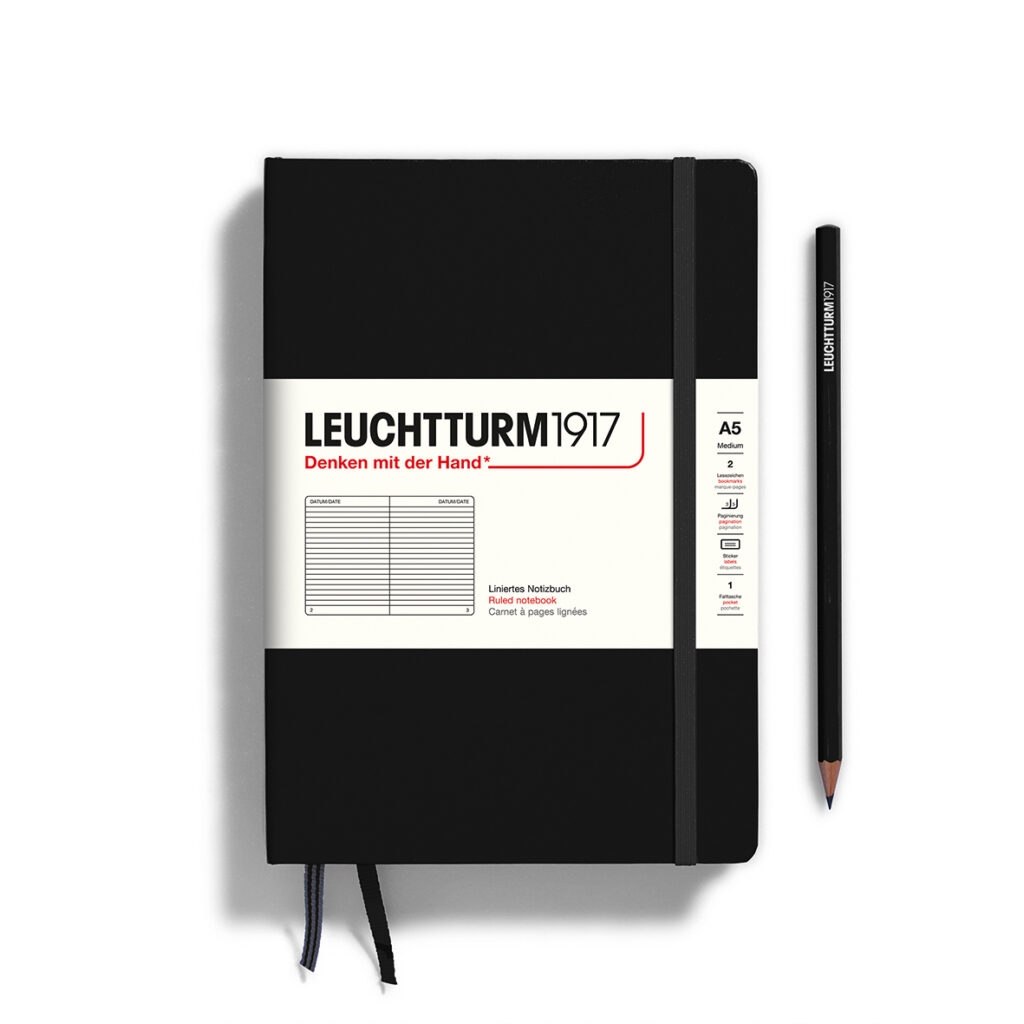Morning pages is a concept from Julia Cameron’s book The Artist’s Way. Writing morning pages has many benefits, but some people don’t find it easy, so I thought I’d share my journey with morning pages, my technique, how I lay out my notebook – why I use four pages instead of three! – and how I use what appears in my morning pages to really make the most of them.
These are the bedrock of everything I’ve done
– Sebastian Baczkiewicz
I was first introduced to the idea of morning pages by a playwright I really admire called Sebastian Baczkiewicz.
We’d been at a writing workshop at a place in Scotland called Moniack Mhor. It’s a really lovely place. If you get a chance to go, I’d certainly recommend it.
We were at the end of the course, Sebastian was one of the tutors, and just as he was preparing to leave – standing there with his suitcase and his coat on – he mentioned morning pages and showed us his notebook.
He pointed to the lines and said
These are the bedrock of everything I’ve done.
And I thought, blimey – I’ll have some of that.
As we all crowded round and looked at these scribbled lines someone noticed he’d written “and so it goes” over and over again a few times, and asked him what that meant.
He said well, if I’m writing my morning pages and my mind goes blank for a moment I just write “and so it goes” over and over again until something else clicks in.
This is because one of the most important aspects of writing morning pages is that you don’t stop.

You just keep the pen or pencil moving across the page. You don’t stop, you don’t think, you just write.
We’re so used to thinking about what we’re going to say and what we’re going to write and how we’re going to say it that we automatically censor ourselves without realising that’s what we’re doing.
Just let go and follow the writing
A lot of people also worry that someone might find this writing, read it and – well what then? They’re going to judge us? Ridicule us? What?
This is all part of being too concerned with what other people think and letting that fear influence what we do.
Morning pages are a chance to release ourselves from such constraints.
But this is something we have to learn to do.
I recently introduced the idea of morning pages to a writer I’d met, and she said I didn’t know where to start.
And I said well, that’s where you start – by just writing that you don’t know where to start… and then you just see what comes next.
Just let your mind be free. Just let go and follow the writing.
It’s this letting go that can be difficult. Giving yourself permission to write absolutely anything. Because it’s just not something we’re really allowed to do in life.
It’s this freeing up that makes this a journey of self-discovery. We’re not controlling. We’re not consciously creating. We’re just along for the ride.
It’s important not to get too hung up on this being of any value. Because it might not be. Writing these pages… you’re not actually in the process of making something. But it can be – cleansing. An outpouring.
Don’t forget that this is private writing. Writing that’s just for you. You can say anything you want.
Anything.
And the real benefit comes from those unexpected words.
When you learn to let go, writing morning pages really is a bit like meditation.
It doesn’t matter if they’re repetitive or trivial or don’t seem important. You just do it.
There’s no right or wrong way to do morning pages
– Julia Cameron
However you do them is the right way for you.
You just do it.
So I’ve been writing morning pages for a few years now, and they’ve become a daily ritual. I write them every weekday morning. I give myself weekends off, because I think it helps to give that muscle a rest.
If there’s a weekday I can’t do it for some reason, I can actually feel a bit anxious about that. It’s almost like something I just have to do.
So let’s talk about my notebook layout.
Julia Cameron’s American so she says use three sides of letter-size paper, which is slightly bigger than A5 – sort of between A5 and A4. I’m in Britain so I use A5.

I use a lined Leuchtturm1917 Medium hardback notebook.
I’ve tried lots and this is the one I like best for this particular purpose. I like the spacing of the lines, I like the size of the pages, I like the feel of the book.
So what I do every Friday is I lay out my notebook for the following week.
I use four sides for each day.
On the first side I’ll write what day it is and the date, then write the date on the following three sides.
And then the fourth side – this is for my evening check-in at the end of the day. So in the morning I’m doing uncontrolled free-writing in my morning pages, in the evening I do a reflection on the day.
At the top of that fourth page I write Notes, Check-in, Q and underline that.
I use a pencil because my handwriting’s terrible, and this helps keep my writing at least a little bit legible, and I keep a highlighter pen on the notebook too.
I start to write, and as I’m going along, if anything comes up that I feel is important or might be, or just maybe interesting or there’s something there I want to act upon or think about more, I quickly draw two little lines in the margin, but I keep writing.
So I keep writing and eventually I’ve done my three pages.
They take me about 20 minutes.
Then if there’s anything that seems important – I’ve done my little lines in the margin – this is where the highlighter comes in.
I’ll go back and take a look at those marks and maybe highlight those points.
These are usually creative ideas for videos or writing, or more practical things like – I should really rename my YouTube channel from The Overthinker, which it was, to Martin Sketchley which it is now. And that came up in morning pages.
It’s almost like someone else is giving you advice. And I guess that’s maybe your subconscious.
The value in these highlights is that, for me, they tend to be the real meat of the pages. The real value in the ritual, and the time spent. The actual effort made in going and sitting and writing them before I do anything else in the day.
Because sometimes it would be easy not to do these things, it would be easy not to write these pages. I could just get up and go out and walk the dog and then get on with my day. Get a head start. You know, I’m spending 20, 25 minutes here writing some stuff that might not be of any use.
But when it is of use, it’s really useful.
So there we go! That’s morning pages.
Links
More from Martin Sketchley
The Artist’s Way
The Artist’s Way Morning Pages Journal: A Companion Volume to The Artist’s Way
Make a donation to help with our running costs
Did you know that Macfilos is run by five photography enthusiasts based in the UK, USA and Europe? We cover all the substantial costs of running the site, and we do not carry advertising because it spoils readers’ enjoyment. Any amount, however small, will be appreciated, and we will write to acknowledge your generosity.


Thank you for a very stimulating article, also quite Zen in its way. There are other meditative traditions, too, which emphasize free rein to the day in the morning and review in the evening. I think there could be a photographic practice called morning images, working in the same uncensorious way. Might be worth trying.